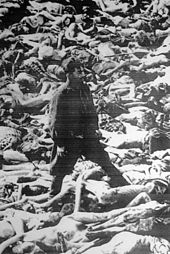Fritz Klein
Fritz Klein | |
|---|---|
 Klein at his trial in 1945 | |
| Born | 24 November 1888 Feketehalom, Austria-Hungary |
| Died | 13 December 1945 (aged 57) Hamelin, Germany |
| Allegiance | |
| Service | |
| Other work | Hanged for atrocities committed at Bergen-Belsen, Auschwitz and other concentration camps |

Fritz Klein (24 November 1888 – 13 December 1945) was a German Nazi physician hanged for his role in atrocities at Bergen-Belsen concentration camp during the Holocaust.
Early life and education
Klein was born in Feketehalom, Austria-Hungary (now Codlea in central Romania).[1] Klein was considered a Volksdeutscher, or ethnic German. He studied medicine at the University of Budapest and completed his military service in Romania, finishing his studies in Budapest after World War I. He lived as a doctor in Siebenbürgen (Transylvania). In 1939 as a Romanian citizen he was drafted into the Romanian army, where after the outbreak of the war with the Soviet Union in 1941 he served as paramedic on the eastern front. In May 1943 Romanian dictator Marshal Antonescu, on a demand from Hitler to release ethnic Germans in the Romanian Army, drafted them into the German army. Hence Klein became a soldier in the Waffen-SS, was listed in the SS-Personalhauptamt, and was posted to Yugoslavia.
Career
On 15 December 1943, he arrived in Auschwitz concentration camp, where at first he served as a camp doctor in the women’s camp in Birkenau. Subsequently, he worked as a camp doctor in the Gypsy camp. He also participated in numerous selections ("Selektionen") on the ramp. In December 1944 he was transferred to Neuengamme concentration camp, from where he was sent to Bergen-Belsen concentration camp in January 1945. He remained at the camp with commandant Josef Kramer and assisted in handing it over to British troops. Klein was imprisoned and required to help bury all unburied corpses in mass graves. The British Fifth Army Film & Photographic Unit photographed Klein standing in a mass grave in a well-known 1945 photo.
When asked how he reconciled his actions with his ethical obligations as a physician, Klein famously stated:
"My Hippocratic oath tells me to cut a gangrenous appendix out of the human body. The Jews are the gangrenous appendix of mankind. That's why I cut them out."[2]
Klein and 44 other camp staff were tried in the Belsen Trial by a British military court at Lüneburg. The trial lasted several weeks from September to November 1945. During the trial Anita Lasker testified that he took part in selections for the gas chamber.[3] He was sentenced to death and hanged at Hamelin jail by Albert Pierrepoint on 13 December 1945.[4][5]
References
- ^ Onciu, Camelia "Bestia in halat alb" Monitorul Expres (April 15, 2008) Retrieved October 15, 2010. Template:Ro icon
- ^ Brueggemann, Rudy Mad Science And Criminal Medicine (2000) Retrieved October 15, 2010.
- ^ Law reports of trials of war criminals, selected and prepared by the United Nations War Crimes Commission. – Volume II, The Belsen Trial (PDF). London: United Nations War Crimes Commission. 1947. p. 21f.
- ^ Associated Press (November 16, 1945). 30 Germans guilty of camp murders. New York Times
- ^ Associated Press (December 14, 1945). 11 Belsen Gang Leaders Hanged for War Crimes. Christian Science Monitor
Further reading
- Lifton, Robert Jay (1986). The Nazi doctors: medical killing and the psychology of genocide. Basic Books.
- 1945 deaths
- 1888 births
- People from Brașov County
- People from the Kingdom of Hungary
- Auschwitz concentration camp personnel
- Nazi physicians
- Neuengamme concentration camp personnel
- Belsen Trial executions
- Executed Austrian people
- Austrian people executed abroad
- Austro-Hungarian military personnel of World War I
- Executed Romanian people
- Executed Austrian Nazis
- Porajmos perpetrators
- Waffen-SS personnel
